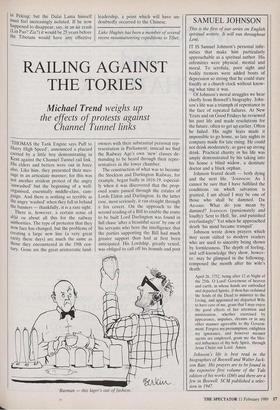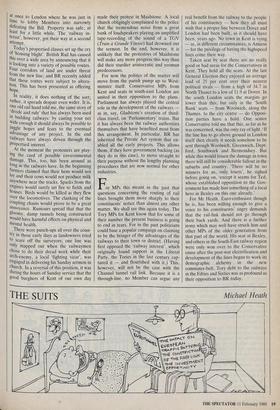RAILING AGAINST THE TORIES
Michael Trend weighs up
the effects of protests against Channel Tunnel links
`THOMAS the Tank Engine says Puff to Harry High Speed', announced a placard carried by a little boy demonstrating in Kent against the Channel Tunnel rail link. His elders and betters were out in force also. Like him, they presented their mes- sage in an articulate manner; for this was not another strident protest of the angry unwashed' but the beginning of a well- organised, essentially middle-class, cam- paign. And there is nothing so terrible as the angry 'washed' when they fall in behind the banners — thankfully, it is a rare sight.
There is, however, a certain sense of deja vu about all this for the railway authorities. The type of protestor that they now face has changed, but the problems of creating a large new line (a very great rarity these days) are much the same as those they encountered in the 19th cen- tury. Gone are the great aristocratic land-
owners with their substantial personal rep- resentation in Parliament; instead we find the Railway Age's own 'new' classes de- manding to be heard through their repre- sentatives in the lower chamber.
The construction of what was to become the Stockton and Darlington Railway, for example, began badly in 1818-19, especial- ly when it was discovered that the prop- osed route passed through the estates of Lords Eldon and Darlington. In the latter case, most seriously, it ran straight through a fox covert. On the approach to the second reading of a Bill to enable the route to be built Lord Darlington was found in full chase 'after a beautiful scent' by one of his servants who bore the intelligence that the parties supporting the Bill had much greater support than had at first been anticipated. His Lordship, greatly vexed, was obliged to call off his hounds and post 'Barman — this lager's out of fashion.'
at once to London where he was just in time to lobby Members into narrowly defeating the Bill. Property was safe; at least for a little while. The 'railway in- terest', however, got their way at a second attempt. Today's propertied classes set up the cry of 'housing blight'. British Rail has caused this over a wide area by announcing that it is looking into a variety of possible routes. Pour corridors of land are under threat from the new line; and BR recently added that these routes were subject to altera- tion. This has been presented as offering hope.
In reality, it does nothing of. the sort; rather, it spreads despair even wider. It is, one old rail hand told me, the same story of 'divide and rule' that has always been used in building railways: by casting your net wide enough it should always be possible to Juggle hopes and fears to the eventual advantage of any project. In the end railways have always driven through the propertied interest.
At the moment the protesters are play- ing the card of possible environmental damage. This, too, has been around as long as the railways have. In the beginning farmers claimed that their hens would not lay and their cows would not produce milk anywhere near the tracks. Sparks :from the engines would surely set fire to fields and houses. Birds would be killed as they flew over the locomotives. The clanking of the coupling chains would prove to be a great annoyance. RuMours spread that that the gloomy, damp tunnels being constructed Would have harmful effects on physical and mental health.
There were punch-ups all over the coun- try in those early days as landowners tried to scare off the surveyors; one line was only mapped out when the railwaymen chose to do their dread work while their arch-enemy, a local 'fighting vicar', was engaged in delivering his Sunday sermon in church. In a reversal of this position, it was during the hours of Sunday service that the good burghers of Kent of our own day made their protest in Maidstone. A local church obligingly complained to the police that the tremendous noise from a great bank of loudspeakers playing an amplified tape-recording of the sound of a TGV (Train a Grande Vitesse) had drowned out the sermon. In the end, however, it is unlikely that the protestors of Maidstone will make any more progress this way than did their sturdier aristocratic and yeoman predecessors.
For now the politics of the matter will move from the parish pump up to West- minster itself. Conservative MPs from Kent and seats in south-east London are united in their opposition to the plans. Parliament has always played the central role in the development of the railways as in, say, Gladstone's creation of third- class travel, on 'Parliamentary' trains. But it has always been the railway authorities themselves that have benefited most from this arrangement. In particular, BR has inherited the Ptivate Act system that en- abled all the early projects. This allows them, if they have government backing (as they do in this case), to move straight to their purpose without the lengthy planning procedures that are now normal for other industries.
MPs this meant in the past that
Er
questions concerning the routing of rail lines brought thein more sharply to their constituents' notice than almost any other matter. We shall see this again today. The Tory MPs for Kent know that for some of their number the present business is going to end in tears. For in the past politicians could base a popular campaign on claiming to be the bringer of the advantages of the railways to their town or district. (Having first opposed the 'railway interest', which originally found support in the Liberal Party, the Tories in the last century cap- tured it — and flourished with it.) This, however, will not be the case with the Channel tunnel rail link. Because it is a through-line, no Member can argue any
real benefit from the railway to the people of his constituency — how they all must wish that a proper line between Dover and London had been built, as it should have been, years ago. No town in Kent is vying — as, in different circumstances, is Amiens — for the privilege of having the highspeed lines come their way.
Taken seat by seat there are no really good or bad areas for the Conservatives in Kent. They hold all the seats. At the last General Election they enjoyed an average lead of 25 per cent over their nearest political rivals — from a high of 34.7 in North Thanet to a low of 11.9 at Dover. In the south London seats the margins go lower than this; but only in the 'South Bank' seats — from Woolwich, along the Thames, to the city centre — do Opposi- tion parties have a hold. One senior Conservative told me that this, as far as he was concerned, was the only ray of light. 'If the line has to go above ground in London itself then clearly it needs somehow to be sent through Woolwich, Greenwich, Dept- ford, Southwark and Bermondsey. But While this would lessen the damage in town there will still be considerable fallout in the suburbs and country. `There will be no winners for us, only losers', he sighed before going on, 'except it seems for Ted, whose established opposition to the Gov- ernment.has made him something of a local hero in Bexley on this one already.'
For Mr Heath, Euro-enthusiast though he is, has been willing enough to give a voice to his constituents' angry demands that the rail-link should not go through their back yards. And there is a further irony which may well have struck him and other MPs of the older generation from that part of the world. His seat at Bexley, and others in the South-East railway region were only won over to the Conservative cause after the post-war electrification and development of the lines began to work its demographic alchemy in the new commuter-belt. Tory debt to the railways in the Fifties and Sixties was as profound as their opposition to BR today.



























































 Previous page
Previous page